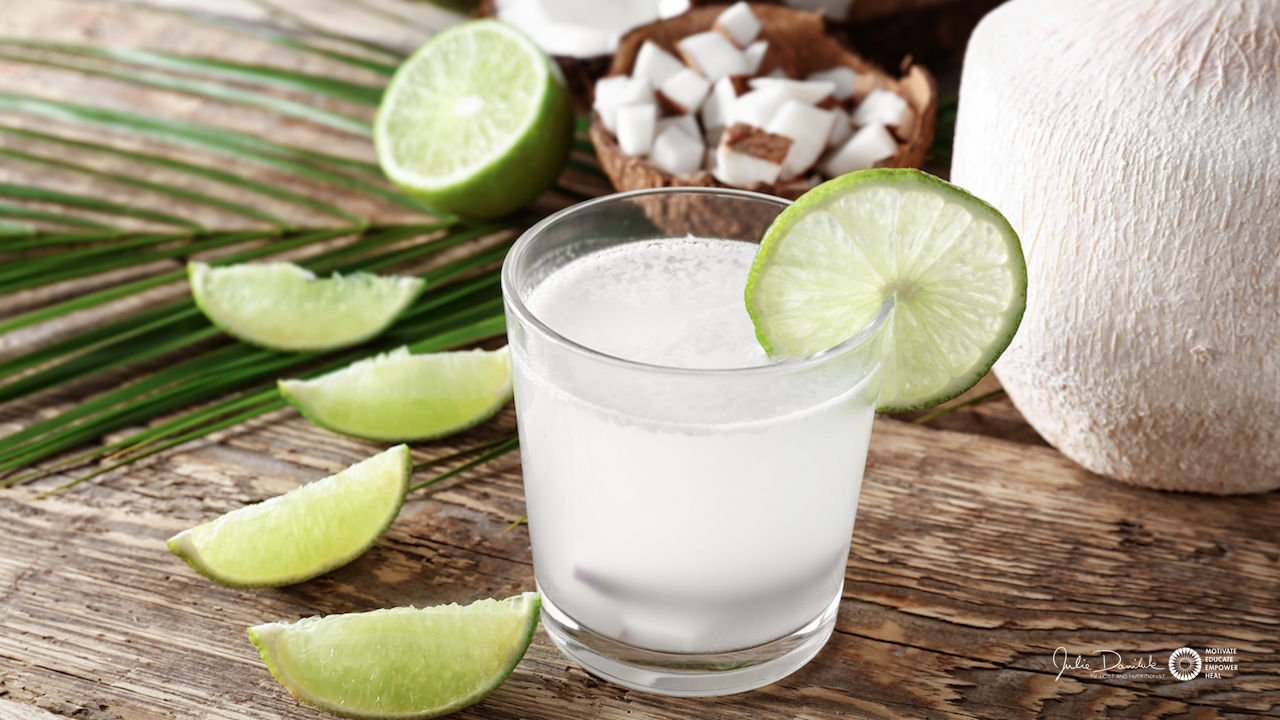Coconut Water | The Ultimate Sports Drink & Post-Workout Recovery

Today, we're diving into the refreshing world of coconut water, particularly focusing on why it's a fantastic choice for your post-workout recovery drink.
From an anti-inflammatory nutrition standpoint, coconut water is a powerhouse that not only hydrates but also aids in muscle recovery and reduces inflammation.
Packed with essential electrolytes, rich in antioxidants, and containing just the right amount of natural sugars, it's a natural, healthier alternative to many commercial sports drinks.
So, whether you're a fitness enthusiast or just someone who enjoys living healthily, join me as we unpack the benefits of drinking coconut water after your workout.
Remember, a balanced diet is key to a healthy lifestyle, and coconut water can certainly be part of that balance. Let's dive in! 
1. Get the right balance.
Commercial sport drink companies realize that electrolyte replacement is a fundamental part of recovery. Unfortunately, the only electrolyte that seems to be replaced by these drinks is sodium, when what's really needed is a balance between sodium and potassium. Every cup of Coconut Water has an ideal 2:1 ratio of potassium to sodium, 60mg of magnesium (for proper muscle relaxation and recovery) and 58mg of calcium (to fuel muscle contraction)! That’s more potassium than a banana and more magnesium than spinach!
2. Get the right calories.
Coconut Water contains 29% fewer calories and half the sugar of an equal serving of Gatorade. Commercial sports drinks add liquid sugar, dextrose, modified cane starch and fructose. In other words sugar, sugar, sugar and a bit more sugar.
|
Content per
1 cup serving |
Calories |
Sugar |
Sodium |
Potassium |
Calcium |
Magnesium |
| Gatorade |
63 |
12.79 g |
95mg |
37mg |
2mg |
0mg |
| Coconut Water |
46 |
6.26 g |
252mg |
600mg |
58mg |
60mg |
3. Get the right ingredients.
If you're still not convinced to give coconut water a shot, think about the potential health implications that are included in that long list of ingredients you find on the sport drink bottles (following at least three different kinds of sugar).
Sodium Citrate, Monopotassium Phosphate and Citric Acid are all used in commercial sport drinks as preservatives and emulsifiers, unfortunately, all have the same reaction in your body – lowering pH and creating an acidic environment. Lower pH and an acidic environment forces your body to tap into calcium and magnesium reserves to buffer the acid in your body and attempt to return your pH to a normal level. Keep in mind that a loss in calcium and magnesium can put you at increased risk for osteoporosis.
Many commercial recovery sports drinks contain Brominated Vegetable Oil (usually derived from soybeans) to stabilize the artificial colours and flavours to prevent separation. This ingredient usually creates the opaque/foggy appearance that many of these drinks share. Bromine is not found naturally in any foods, and there is no safe amount that can be tolerated in the diet. In fact, consuming excessive amounts of brominated vegetable oil has been shown to create symptoms of mental fatigue, skin pustules, memory loss, slurred speech, tremors, ataxia (coordination) and muscular weakness, as well as a transitory state which has resembled Paranoid Schizophrenia in extreme cases!
4. Get the right cost.
Get ready to tote around a heavy pocketbook! Costing approximately $1.50 - $2.00 per can, coconut water offers huge price savings from leading commercial sports drinks, charging between $2.50 - $5.00 per bottle!
 Lastly...
Lastly...
Training is hard! Don’t sabotage your potential for results after all your hard workouts by ingesting a chemical cocktail. Give coconut water a shot after or during your next workout.
My talented nephew, Taevan Gangnier, teaches movement in our Thrive Hive and has created a powerfully rejuvenating post-workout smoothie that refuels and refreshes. Give it a try!
Tae’s Post-Workout Fuel
Ingredients:
- 2 cups Coconut Water
- 2 cups Blueberries
- 1 cup Mango
- 1/2 cup Filtered Water
- 4 tbsp Protein Powder
- 1 tbsp Raw Honey
- 1/2 tbsp Magnesium Powder
Directions:
- Purée all ingredients in a blender until smooth.
This recipe makes 3 to 4 servings, so cut this recipe in half, if needed. If you choose to drink this for breakfast, cut out the raw honey.


